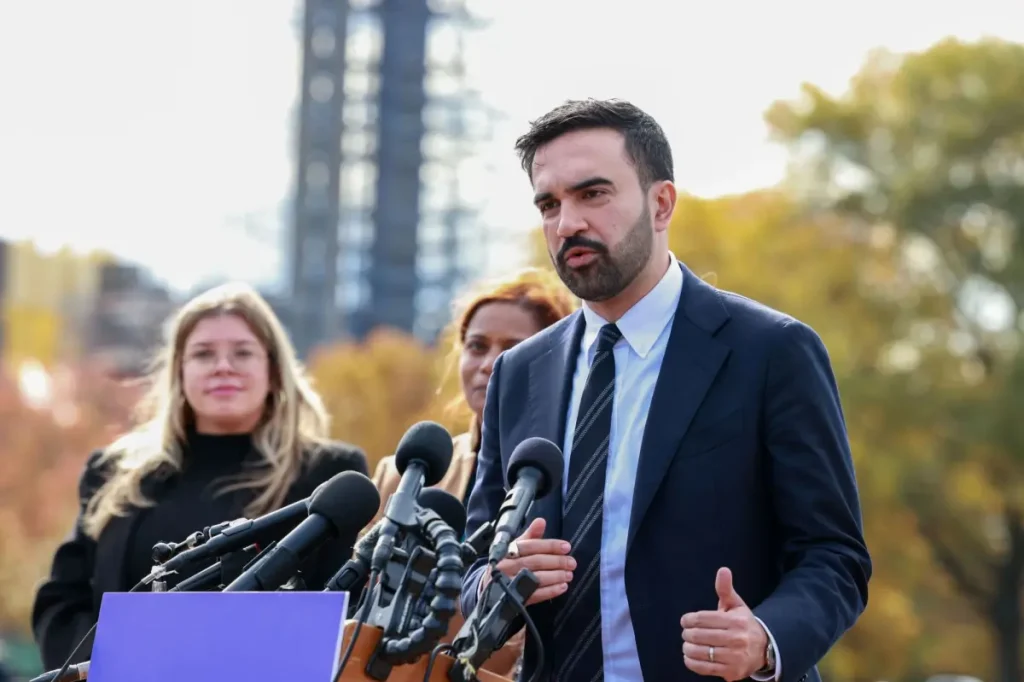Mayor-elect Mamdani Meets with Police Commissioner, Signals Intention to Retain Her
In a recent interview with ABC7’s Bill Ritter, Mayor-elect Zohran Mamdani revealed that he has met with Police Commissioner Jessica Tisch and hopes she will remain at the helm of the NYPD during his administration. “I do want her to stay,” Mamdani stated, reaffirming a commitment he made during his election campaign. This meeting represents a significant step for the democratic socialist mayor-elect, who has been working to reframe his earlier positions on law enforcement that included “defund the police” rhetoric. While Mamdani has expressed his desire to keep Tisch in her role, the commissioner herself has not yet publicly commented on whether she would consider continuing to serve under the incoming administration. The meeting highlights Mamdani’s efforts to build bridges with law enforcement leadership as he prepares to take office, despite potential philosophical differences that may emerge in their working relationship.
Mamdani spoke highly of Commissioner Tisch during the interview, particularly praising her efforts to address internal issues within the NYPD. He noted that “She came into a police department where Mayor Adams had stacked the upper echelons with corruption and incompetence,” taking a direct swipe at the outgoing administration while crediting Tisch with bringing positive change. “She started to root that out, started to deliver accountability and reduce crime across the five boroughs. That’s something I’m looking to build on under a Mamdani administration,” he added. This praise suggests Mamdani sees value in continuity of leadership at the NYPD, despite his previous criticisms of policing approaches. Tisch has gained popularity for her management style and results, bringing stability to a department that has faced significant challenges and scrutiny. By expressing support for her leadership, Mamdani appears to be signaling a more moderate approach to policing than some might have expected based on his campaign rhetoric.
Despite these overtures toward cooperation, potential points of contention between Mamdani and Tisch have already emerged. One key area of disagreement concerns police staffing levels. While Commissioner Tisch has advocated for hiring more officers to strengthen the department, Mamdani expressed a different view, stating, “I think the number of officers we have is the right amount.” This difference in perspective could prove challenging as they work to find common ground on department resources and priorities. Additionally, Mamdani has committed to establishing a Department of Community Safety, which would respond to emergency calls involving mentally ill or homeless individuals. He framed this initiative as one that would allow police officers to focus on more serious crimes, but law enforcement officials have criticized the plan as “dangerous and impractical.” These divergent viewpoints on fundamental aspects of public safety strategy suggest that, despite their mutual respect, Mamdani and Tisch may face significant hurdles in aligning their approaches.
When questioned about the specific content of his meeting with Tisch, Mamdani emphasized that their discussion centered on crime reduction strategies. He described the meeting as being “more about what it could look like to continue to deliver public safety and what it could look like especially without the distractions we’ve seen over the past few years.” This characterization suggests a focus on practical outcomes rather than ideological debates. However, when asked whether he would micromanage the police department based on what some consider radical ideology, Mamdani notably avoided directly answering the question. This evasion may raise concerns among those already skeptical of how his progressive politics will influence his approach to law enforcement. The mayor-elect’s reluctance to address such questions head-on could indicate the delicate balancing act he faces as he tries to reassure traditional law enforcement supporters while staying true to the progressive base that elected him.
Mamdani attempted to frame his vision for public safety in terms that could appeal to a broad spectrum of New Yorkers. “I want this to be about the outcomes,” he stated, adding that “The most important thing is that New Yorkers are given a city that is safe and a city that is just, and too often those things have been put in tension.” This statement reflects his desire to transcend the traditional dichotomies that have characterized debates about policing and public safety. By emphasizing both safety and justice as complementary rather than competing goals, Mamdani appears to be positioning himself as a bridge-builder who can unite diverse perspectives on these contentious issues. However, the practical implementation of policies that satisfy both traditional law enforcement advocates and criminal justice reform proponents remains a significant challenge that the incoming mayor will need to navigate carefully.
As Mamdani prepares to take office, his outreach to Commissioner Tisch represents both an opportunity and a test case for his broader approach to governance. The mayor-elect, known for his democratic socialist views, is demonstrating pragmatism by seeking to retain a respected commissioner from a more moderate administration. This move suggests he understands the importance of experienced leadership in maintaining public safety, even as he looks to implement progressive reforms. The potential partnership between Mamdani and Tisch, if it materializes, would be closely watched as an indicator of whether progressive politicians and traditional law enforcement leaders can find effective common ground. Their ability to work together productively despite philosophical differences could establish a model for collaboration across political divides on one of the most challenging issues facing urban America. However, the success of this relationship will ultimately depend on both parties’ willingness to compromise and prioritize practical results over ideological purity.








